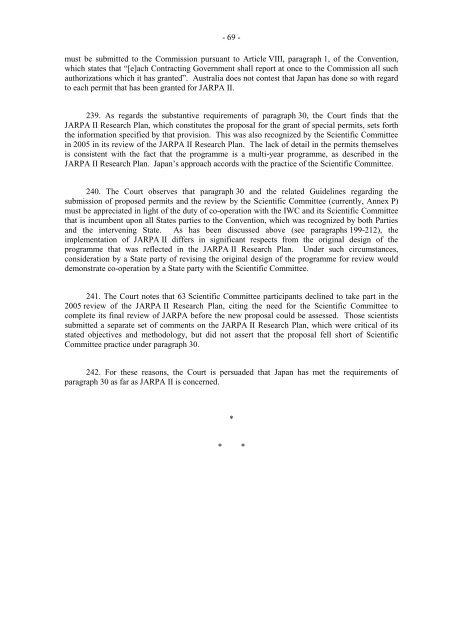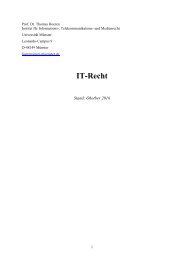3d4yVkKMl
3d4yVkKMl
3d4yVkKMl
You also want an ePaper? Increase the reach of your titles
YUMPU automatically turns print PDFs into web optimized ePapers that Google loves.
- 69 -<br />
must be submitted to the Commission pursuant to Article VIII, paragraph 1, of the Convention,<br />
which states that “[e]ach Contracting Government shall report at once to the Commission all such<br />
authorizations which it has granted”. Australia does not contest that Japan has done so with regard<br />
to each permit that has been granted for JARPA II.<br />
239. As regards the substantive requirements of paragraph 30, the Court finds that the<br />
JARPA II Research Plan, which constitutes the proposal for the grant of special permits, sets forth<br />
the information specified by that provision. This was also recognized by the Scientific Committee<br />
in 2005 in its review of the JARPA II Research Plan. The lack of detail in the permits themselves<br />
is consistent with the fact that the programme is a multi-year programme, as described in the<br />
JARPA II Research Plan. Japan’s approach accords with the practice of the Scientific Committee.<br />
240. The Court observes that paragraph 30 and the related Guidelines regarding the<br />
submission of proposed permits and the review by the Scientific Committee (currently, Annex P)<br />
must be appreciated in light of the duty of co-operation with the IWC and its Scientific Committee<br />
that is incumbent upon all States parties to the Convention, which was recognized by both Parties<br />
and the intervening State. As has been discussed above (see paragraphs 199-212), the<br />
implementation of JARPA II differs in significant respects from the original design of the<br />
programme that was reflected in the JARPA II Research Plan. Under such circumstances,<br />
consideration by a State party of revising the original design of the programme for review would<br />
demonstrate co-operation by a State party with the Scientific Committee.<br />
241. The Court notes that 63 Scientific Committee participants declined to take part in the<br />
2005 review of the JARPA II Research Plan, citing the need for the Scientific Committee to<br />
complete its final review of JARPA before the new proposal could be assessed. Those scientists<br />
submitted a separate set of comments on the JARPA II Research Plan, which were critical of its<br />
stated objectives and methodology, but did not assert that the proposal fell short of Scientific<br />
Committee practice under paragraph 30.<br />
242. For these reasons, the Court is persuaded that Japan has met the requirements of<br />
paragraph 30 as far as JARPA II is concerned.<br />
*<br />
* *



